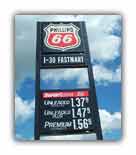 |





Oil Embargo Information
Greenpeace
OPEC
|
 |

Disco Wasn't the Only Annoying Thing in the Seventies. Check Out Those Long Lines at the Gas Pumps!

|

Our Own Little Energy Crisis.... "Oh, we need gas!"
|
The gas tank of the car is running on empty. Just fill it up, you say? Well, if this were 1973, it would not be that easy. First we'd have to check the last number of our license plate, is it odd or even? If we have the correct number we can go to the gas station. Now we would have to wait in line for AT LEAST an hour before getting to the pumps. Ok, now we are here. What do you mean we can only put in ten gallons? My car takes at least 15! That means we would not be able to fill up the tank and would have to start the whole process over the day after tomorrow when it would be our turn again. Did I forget to mention that the price of gas would have doubled since the week before? Sounds crazy, doesn't it? But this is exactly what was happening during the Arab Oil Embargo of 1973.

|
 |
I was only three years old, but even I have a memory of the crazy energy crisis of the early seventies. It was the first time our country was forced to examine its use of energy and look at the way in which we obtained our energy resources. And we haven't stopped exploring these important issues since.
Whether putting gas in your car, heating your home on a winter evening, or plugging in your computer, you are using fuel. In the post-war boom of the fifties, no one gave much thought to where or how our energy came to us. But in the sixties, things began to change. The Arab countries that produced oil formed a coalition to gain greater control of the precious resources they were exporting. OPEC (Organization for Petroleum Exporting Countries) was born. Since that time, countries from around the world have joined the coalition, including countries from Latin America, South Africa, and Southeast Asia. The coalition made good business sense, but you can't forget about the politics!
On October 6, 1973, Egypt and Syria attacked Israel. In order to destabilize Israel's allies, OPEC agreed to an oil embargo and stopped selling fuel to the Western countries that supported Israel. They were punishing the "friends of its enemies." The embargo was felt immediately by the American public. President Nixon called for the nation to voluntarily cut back on their use of gas. Gas stations closed their doors on Sundays. Gas prices shot up from 30 cents a gallon to over a dollar a gallon. People worried that there just wouldn't be enough gas to go around.
Consumers, as well as the government, had to come face to face with the fact that we were using a resource that was not going to last forever. President Nixon formed a new cabinet called the Energy Department. They worked on plans to find more resources so the U.S. would not be dependent on exporters like OPEC. Exploration and development of oil resources began around the country. Federal housing codes were elevated to require better insulation, which meant people wouldn't have to use their heaters as much. The government also began giving tax breaks for the development of alternative power sources, like wind and solar power. Americans were learning how to tighten their belts when it came to energy usage.
There are many things around today that came as a result of America's response to the oil embargo. Big gas guzzling cars that once seemed luxurious, were seen to be expensive and costly when it was time to refuel. I know at The Odyssey, we drive economy cars that use little gas, but go a long way. These cars came out of the federal laws in the seventies that mandated new car ratings. Our highway speed limits even came out of the '73 oil crisis. You know the highway signs that tell you to drive 55 miles per hour? Congress enacted the 55 mph rule because you use less fuel when you drive more slowly. And as a bonus, this has also resulted in less fatal accidents. Americans began changing the way they looked at energy consumption, but the quest for resources has not ended.
I visited the Alternative Fuel Research and Education Program in Austin, Texas. They are looking to propane as an alternative to electricity for heating your home and as an alternate choice for fueling your car. The program even gives money to families who purchase a propane water heater instead of an electric one. Because it burns cleanly, propane is more environmentally friendly than the coal that is usually burned to create electricity. You can even buy a car that uses propane instead of gasoline. But the downside is, it's much harder to find a propane station to fill 'er up. The bottom line is this- when it comes to energy, we have choices but which will we choose. Americans don't always agree on the best way to find energy. Should we remain in search of renewable resources (sources that are continuously available in our environment) or continue exploration for more crude oil deposits(a non-renewable resource that creates gas for our homes and cars)?
Currently in 2001, the Bush administration has its eye on an Arctic Wildlife Refuge in Alaska because it is rich in crude oil. The administration has proposed opening the refuge to drilling and intends to build a pipeline to bring Alaska's gas to the continental United States. This is part of Bush's goal to cut U.S. dependence on foreign oil. (Just like Nixon was trying to do in the seventies.) Groups like Greenpeace and the Sierra Club argue that drilling in the refuge will not help lessen the dependence on foreign sources for oil, but will threaten caribou, musk oxen, wolves, three different species of bears and hundreds of thousands of birds. Environmental groups like these promote the exploration of renewable resources as an alternative to further drilling and further destruction of the environment.
Renewable sources of energy like hydroelectric power, wind power, and solar power have scarcely been explored. Only about 15-20% of the world's energy needs are being met by renewable resources. This is unfortunate because they are more environmentally friendly and will be around a lot longer than crude oil. Because oil is such a big industry, I believe it is difficult to get government or private investors to put monetary resources into researching these alternative choices. And there will always be opponents finding reasons why not to utilize these options. It has been argued that hydroelectric power can damage river habitats and affect fish populations. There have also been opponents to wind power saying that it is noisy, unattractive and hazardous to birds. Hmm … have these opponents looked at an oil derrick lately? Not only are they unsightly but they're smelly too! And drilling destroys wildlife ecosystems as well (just look at the proposed Alaska pipeline.) There are certainly pros and cons to any natural sources we are considering exploiting. As consumers of energy, we need to take responsibility for our own roles in the conservation of these precious resources.

|
 |
When I was growing up, my mom taught me turn off lights unless I was using them. I still drive my roommates crazy when I go through the house turning off lights if no one is in the room. It sounds simple, but conserving energy is one thing that I can do to make a difference. Carpooling can be another great way to conserve on gas (and cut down on traffic.) There are many communities that organize carpooling for commuters. When I was in highschool my friends and I carpooled to school. And if you live in a city with public transportation, take it! In many states you can even choose the kind of electric company you want to use. You can find a company that uses renewable resources instead of traditional methods. Getting involved in your local chapters of Greenpeace or the Sierra Club is another way to make your voice heard. It is never too early to make conscious decisions that will affect our world. What are you going to do?
Jennifer
Please email me at:
jennifer@ustrek.org
Links to Other Dispatches
Daphne - The 444 days Americans were held hostage in Iran
Neda - CREEP-ing around Watergate ruined President Nixon
Stephanie -The frigid blast of military might known as the Cold War
Daphne - Mary Jane and Jack Daniels can really screw you up
Nick - A deadly bullet and a mishandled trial: Dark days for America
Making A Difference - America: home of the free and the brave?
Stephen - Hey! Pass some of that cold cash with acid rain garnish my way
|



